Global Times
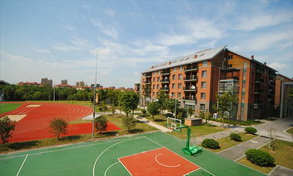
The YK Pao School campus in Songjiang district
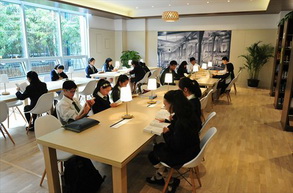
Students reading at the library
Photos: Courtesy of YK Pao School
Founded in 2007 in the memory of Sir Yue-Kong Pao, a renowned Chinese businessman and philanthropist, the YK Pao School is recruiting its inaugural class of about 70 Chinese and foreign students for its secondary school division, which is set to open this fall.
The school will expand this September to include the 10th, 11th and 12th grades. It currently teaches students in grades one through nine.
The YK Pao School has two campuses. The primary school is in Changning district. Its other campus, located in Thames Town in Songjiang district, has a boarding school with day school options.
The Songjiang campus has around 380 students in grades six through nine. It expects to have around 650 students by 2017, reflecting the addition of the high school grades, said Tony Jaccaci, the school's Secondary Division Executive Principal.
In the eyes of Philip Sohmen, the school's founder and deputy chairman, the YK Pao School is an international school that combines the strengths of both the Chinese and Western education systems.
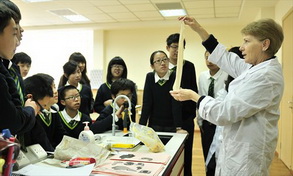
Students get a lab lesson in science class.
The school aims to develop its students' potential, provide them with a foundation in Chinese language and culture and help them become global citizens. Sohmen said the school is not an international school that focuses purely on Western education.
"We value Chinese culture and language greatly, and we think it is necessary to pass on the essence and wealth of Chinese culture to our children," Sohmen said. "Because Shanghai is strong at primary education, we have adopted an integrated Shanghai curriculum with international resources and an international approach, which is called the Shanghai Plus curriculum."
Senior secondary education is crucial for the school to achieve its mission, allowing students to excel in the classroom while developing teamwork and leadership skills, said Wu Zijian, the school's headmaster.
For senior secondary education, the YK Pao School also plans to introduce an International Baccalaureate Diploma Programme (IB), a two-year program that provides an internationally accepted qualification for entry into higher education.
"If you look at the purpose of the IB curriculum and the mission of the YK Pao School, they line up very well," Jaccaci said. "It will help the children receive a well-rounded education."
The curriculum covers six areas, but also leaves students with some choice. "They can decide which areas to study at a higher level and which areas to study at the standard level," Jaccaci said.
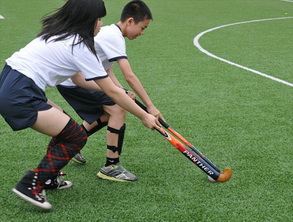
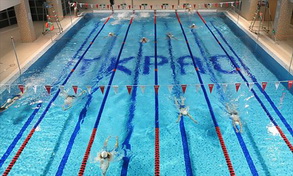
Students play field hockey and swim.
To facilitate a smooth transition from Shanghai Plus to the IB curriculum, 10th graders will study the curriculum for the International General Certificate of Secondary Education (IGCSE), a one-year program that aims to prepare them for the IB curriculum.
"When we switched from the current curriculum to the IGCSE curriculum, I found the latter takes a more systematic approach, as I can clearly see how the education materials are organized and the academic goal that should be achieved," said Ye Ruxin, a ninth grader at the school.
"We value two things most in our applicants," Jaccaci told the Global Times. "One is aptitude, and the other is attitude."
"Truly, attitude is more important. If a student has a good entrepreneurial attitude and takes responsibility for his or her own education - and kids can really do that - they make great progress," Jaccaci said.
The YK Pao School's boarding program aims to provide a safe and free environment for students to be independent and explore a multicultural social life, in which friendships grow and social skills are developed.
Teachers have different roles to play at different times at the school. They can teach mathematics during the day and serve as dorm parents in the evening, providing students with support and guidance.
Jaccaci believes boarding life has special meaning for today's children in China because most of them are the only child in their families.
The ninth grader Ye, who shares a dorm room with three other students, thought the biggest challenge of living together is the different schedules of roommates. "Some people wake up early and take a shower and it makes noise and bothers other people. Some people stay up late," she said.
Basically, teachers encourage students to solve these problems on their own, Ye said.
As a student with seniority at the school, Ye also serves as a semi-dorm-parent for sixth graders, many of whom just started living at the boarding school.
"I find my job influential. When someone breaks the rules, it's not an authority figure, like a teacher, who speaks to you, but someone your own age. You feel more willing to listen," Ye told the Global Times.
The school's students spend half of the time speaking in Chinese and half the time speaking in English. They naturally switch from one language to the other inside and outside the classroom. However, most subjects are taught in English.
Ye said it won't be too difficult for students from local schools, who may not use English as often, to adjust to the situation. "In the classroom, most of our materials are in English," she said. "For sports, my coach does not speak Chinese very well, so we practice in English. There are opportunities all day long to practice English."
(Global Times: 2014-6-10)